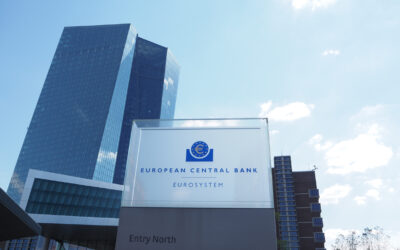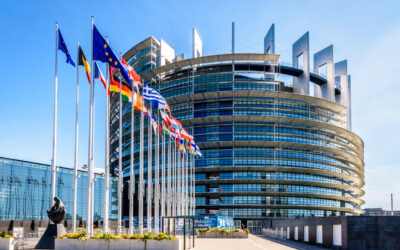Democratize the European Central Bank
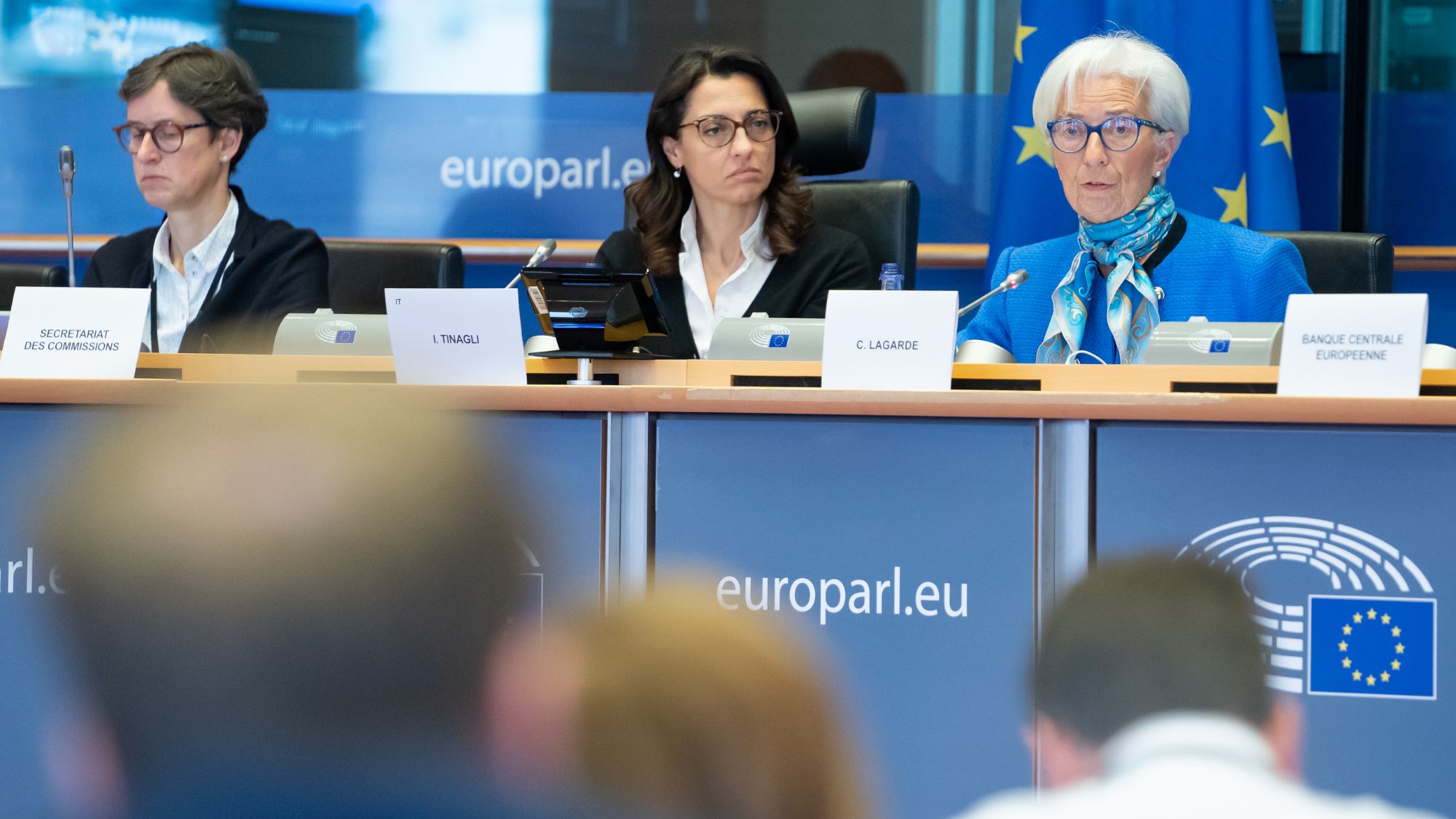
Central banks are very powerful institutions. They can create money in order to support the economy and can set policies independently from elected governments. Positive Money Europe wants to make sure that the extraordinary power of the European Central Bank (ECB) is matched with an important degree of transparency and democratic control.
Central banks are the most powerful economic institutions that exist. For one, they aim to oversee the creation of money into the economy. Secondly, because they have been granted independence from political interference, which allows them to act decisively and with full autonomy.
The ECB is even more powerful than other central banks because it operates ‘above’ nation states in the Eurozone. The ECB’s statutes and independence are enshrined in international treaties, which are difficult to amend.
The financial crisis in Europe has resulted in an increase of influence of the ECB in the decision-making structures of the EU. This increase in power was largely because the Eurozone structure was unprepared for dealing with a crisis, and the ECB is the institution which has the best ability to take fast action — it can create a potentially unlimited amount of money with a few keystrokes.
While the ability of the ECB to act fast was generally helpful in addressing the crisis, the ECB’s independence was perceived as a barrier for monetary policy being used to support Eurozone economies effectively. In addition, the ECB’s involvement in the Troika resulted in situations where decisions from unelected officials at the ECB made the daily lives of millions of citizens harder, and sometimes even helped to determine the fate of national governments. For example, the ECB sent secret letters to head of states in Greece and Italy, which ultimately resulted in the fall of their governments. Similarly, the ECB effectively forced Ireland’s government to bail out the banking sector at the expense of its own citizens, who paid the price of the austerity policies.
All these episodes call for an urgent reform of the European Central Bank.
Reforming the ECB — where to start?
In principle, Positive Money supports central bank independence, in so far as it ensures a robust governance framework that can safeguard monetary policy from undue external pressures. However, as pointed out by Transparency International in 2016, the ECB independence framework is currently overstretched and does not correspond to an adequate level of transparency, integrity and accountability.
Such a framework should also allow for a higher degree of cooperation between the ECB and fiscal policies.
Positive Money Europe’s aim is to reform the ECB and its legal framework in order to maximize its democratic accountability. We will develop research and campaigns in order to pursue the following four goals.
Latest news on the ECB
Understanding the European Central Bank’s reviewed operational framework
Today, the ECB announced changes to its operational framework – the toolbox it uses to implement its monetary policy and maintain price stability. Here is our analysis
A missed opportunity: EU Parliament’s resolution falls short on green initiatives
On Tuesday, 27 February 2024, the European Parliament adopted its annual resolution on the Annual Report of the European Central Bank (ECB). While this resolution is non-binding, it serves as an important tool for monitoring and evaluating the ECB’s activities, both past and present. It also provides a platform for the European Parliament to offer recommendations for the Bank’s future policies. Essentially, it is a key instrument for democratic oversight of an independent institution like the ECB, whose decisions significantly impact the lives of Europeans.
1. INCREASE THE DEMOCRATIC ACCOUNTABILITY OF THE ECB

The ECB is officially accountable to the European Parliament. However this accountability is weak because it is limited to official dialogues between the ECB and Members of the European Parliament (the ‘monetary dialogue’). In addition, the Parliament only has a consultative role in the appointment process of board members, which are effectively nominated behind closed doors by the European Council.
We believe the Parliament should play a stronger role in scrutinizing the ECB’s activities, in particular by reinforcing the role of the monetary dialogue and making sure the ECB responds point by point to the Parliament’s annual report on the ECB. The Parliament should also have a stronger role in the appointment and revocation procedures of ECB board members.
2. CLEAR AND REVIEWABLE MANDATE
While the EU Treaty defines the ECB’s primary objective as maintaining price stability, the treaty does not provide a definition of what price stability means. As a consequence, the ECB is currently self-determining its objective in a somewhat loose manner. This means that the ECB can change its own objective if it is not reaching it, or it can justify not reaching it because of the unclarity of its definition.
We believe the ECB’s objective should not be self-defined by the ECB, and neither should this objective be set in stone for an unlimited period. Instead, monetary policy objectives should be reviewed on a frequent basis, and adjusted if necessary, taking into account the ECB’s past performance in fulfilling them and the economic circumstances.

3. THE ECB MUST SUPPORT SOCIAL AND ENVIRONMENTAL GOALS

Beyond its price stability objective, the EU Treaty binds the ECB to ‘support the general goals of the European Union’, including with regard to social and environmental domains. However, in practice, the ECB is doing close to nothing in those areas.
We believe the ECB must actively support the social and environmental goals of the EU. The ECB should adjust its existing policies so that they could better contribute to the EU goals (for example, by providing helicopter money instead of quantitative easing). Furthermore, the ECB should engage in structural dialogue discussions with the European Parliament, the Commission and the European Investment Bank, in order to find ways to facilitate investments in the green transition. There are many ways the ECB can play a more cooperative role without undermining its own independence.
4. TRANSPARENCY BY DEFAULT
Over the years, the ECB has shown a shocking degree of secrecy multiple times in its activities. For example, the ECB is one of the only central banks that does not disclose the individual voting record of the members of its Governing Council, and has deliberately refused to provide documents to the European Court of Auditors regarding its management of the crisis as part of the Troika. The ECB also refuses to adopt the EU’s transparency register for lobbyists.
While the ECB has made some efforts in this direction, transparency remains the exception rather than the norm. We want to maximize transparency wherever possible.

Join the campaign
As a supporter, you’re at the heart of everything we do. We’d love to keep you updated about our exciting work and the ways you can help, including campaigns and events that you might be interested in. We promise never to sell or swap your details and you can change your preferences at any time. To do so, simply call +32 2 880 04 34 or email info@positivemoney.eu
Further resources
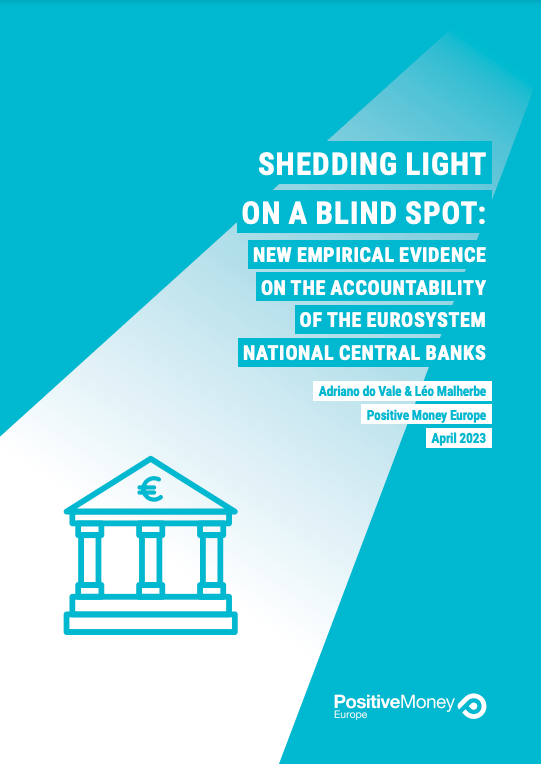
Shedding light on a Blind Spot: the Accountability of the Eurosystem National Central Banks (April 2023)
Eurosystem national central banks have very different procedures when it comes to reporting to political authorities, and are less accountable than the European Central Bank, shows this new research paper. The Bundesbank has the weakest degree of accountability, while Greece and Lithuania, Estonia and Belgium emerge as the most accountable central banks.
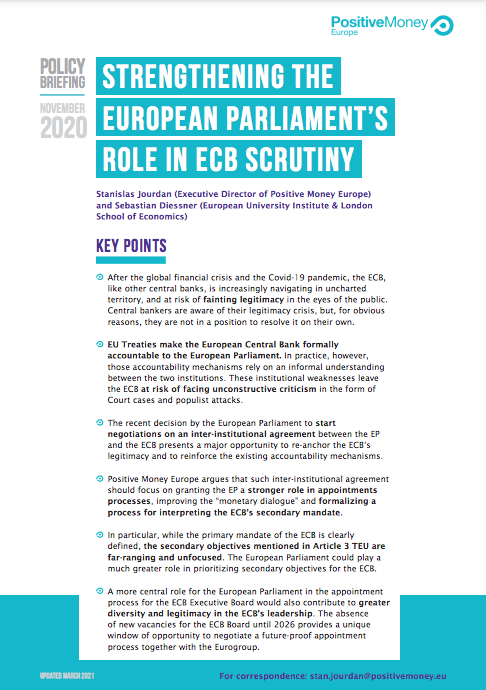
Strengthening the European Parliament’s role in ECB scrutiny (November 2020)
The European Parliament’s (EP) current ability to hold the European Central Bank (ECB) to account is riven with pitfalls and limitations.
This lack of accountability is weakening the ECB’s public legitimacy. For people across Europe to trust the ECB enough to play its role, the bank must be held accountable for its decisions.
This briefing outlines 12 recommendations on how the EP could improve the way it scrutinises the ECB.
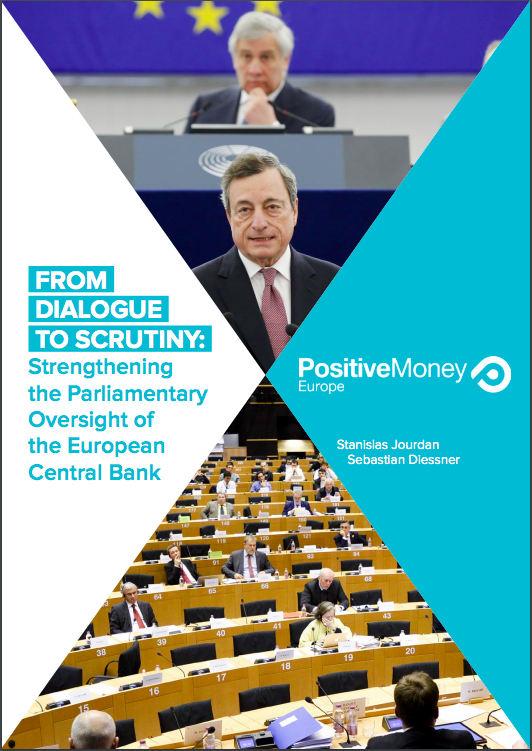
From Dialogue to Scrutiny: Strengthening the Parliamentary oversight of the European Central Bank
In the aftermath of the Eurozone crisis, it is clear that the European Central Bank (ECB) has extended its competences and area of influence. In comparison however, the accountability framework of the ECB was not leveled up – it remains largely weak and informal. This report advocates for a stronger role of the European Parliament in holding the European Central Bank to account and outlines specific recommendations.
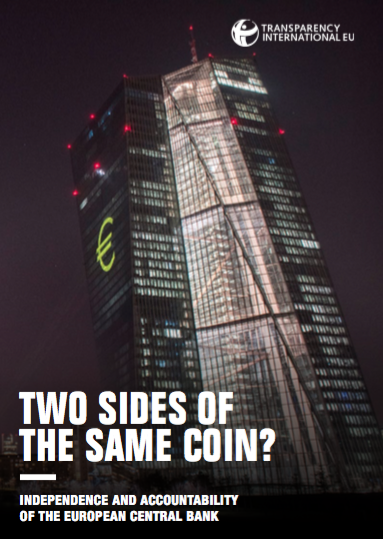
Two sides of the same coin? Independence and accountability of the European Central Bank
An in-depth study by Transparency International that looks into the balance between the ECB’s expanded mandate, its unrivaled independence, and its democratic accountability. It analyses the transparency provisions, which may compensate a lack of democratic control, and the ECB’s integrity framework, making far-reaching recommendations.
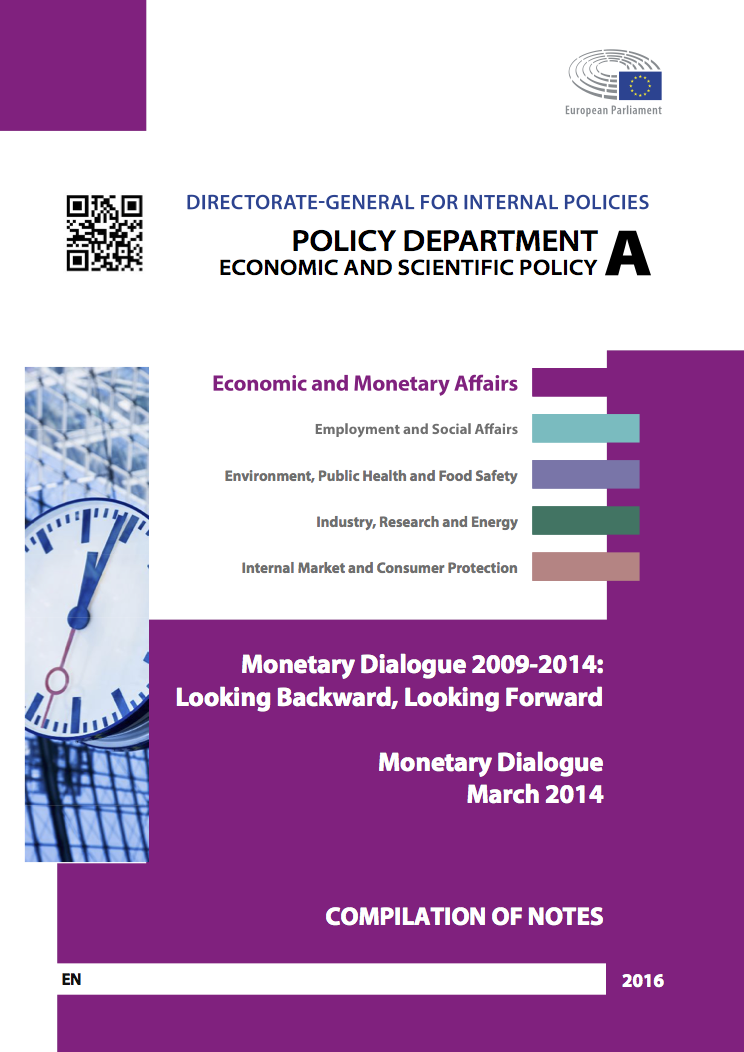
Monetary Dialogue: Looking Backward, Looking Forward (2014)
This compilation of research papers assess the quality of the exchange between the European Parliament and the ECBduring the “Monetary Dialogue”. The authors review the past five years of monetary dialogues and make policy recommendations on how to possibly improve the Monetary Dialogue. The notes by key monetary experts were requested in March 2014 by the Committee on Economic and Monetary Affairs (ECON).

